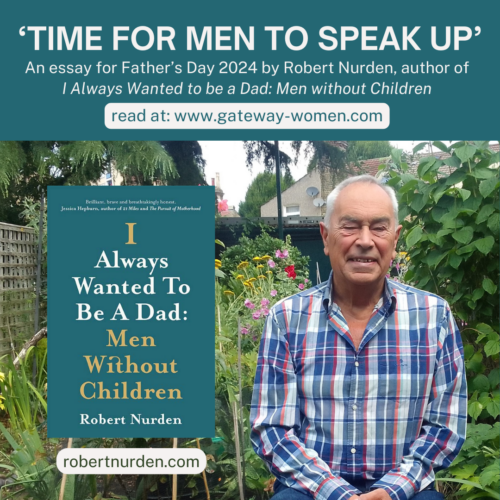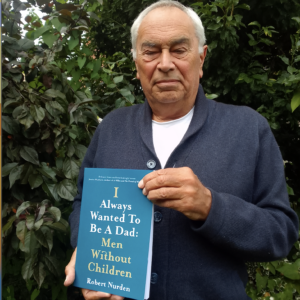A guest blog for Father's Day 2024 by Robert Nurden, author of I Always Wanted to Be a Dad: Men without Children
I was recently interviewed by BBC Radio 5 about my book I Always Wanted To Be A Dad: Men without Children and what it was like being a childless man. It went quite well and afterwards, I posted a short message about it on Facebook.
I chose three childless Facebook groups – Childless not by Choice, Childless over 50 and Ageing without Children (AWOC). I received great support – a total of 198 likes and lots of lovely comments. But 192 of these were from women and only six – yes, six – of the responses were from men. Another post – on the ‘Childless Men’s Community group – received eight likes.
It’s been the same with reviews for my book: over 95 per cent are from women. Oh, yes, and another interview with me – this time with ITV News – is going out on telly on Father’s Day (15 June). And who came up with that idea? Sarah Colley, a female television journalist.
It really got me thinking. What’s going on? Or, rather, what’s not going on? Why are men (still) so silent? Let me just say that this is not about me wanting more acclamation from blokes. Not at all! This is a genuine question that continues to intrigue.
Some of us more vocal childless men like to say from time to time that guys are becoming more open about their feelings and that the landscape is changing. Perhaps the euphoria of the StoryhouseCHILDLESS festival in Chester had lifted our spirits. Or Dr Robin Hadley had had a breakthrough with another brilliant piece of research. Or our own grief had taken a back seat for a few days and we are brimming with confidence. Such events can trigger optimism. There may even be periods when it’s actually true and men do speak out more effectively, but then – as Jody Day points out – it goes quiet again. And here come those murky male mists descending once more.
So, here I am, desperately looking for reasons for men’s relative muteness on this issue. As usual, there are many factors. There’s the shame and stigma attached to the apparent failure to have kids. And, following on from that, there’s the economic shame of not being seen as the provider. Then there’s the legacy question. Someone once said: women share their problems; men share their successes. So, if there is no success to share, men cover up.
And any guy who might have been quite happy to share the pain of his childlessness with other men doesn’t because there is no precedent for doing so. And he certainly can’t offload down the pub. So, lack of infrastructure within society stalls what might spawn a growing movement.
And perhaps – so much of this speculation is ‘perhaps’ (come on, I need help here!) – because men don’t have the support groups that women have access to, it gets worse for them as they get older. For example, I would argue that the pain of being grand-parentless is somehow worse for men because it enhances the feeling of loneliness they already have. In older age the question of status – or, rather, lack of it – becomes starker. Sitting silently at dinner tables at which friends and family, once they’re done with talking about their kids, move onto the grandkids, is a new source of pain for me.
We’re getting nowhere here. So, let’s accept it as it is. Let’s embrace the status quo. Maybe it just has to be like this. Perhaps there’s a good case for childless men suffering in silence and staying strong. In today’s up and at ’em instant gratification culture, have these old-fashioned behaviours been unfairly overlooked? Is it really so wrong to stay buttoned-up? Granite columns – pillars of the community – don’t make a noise. And is there also a place for male apathy and the existential shrug of the shoulders? Emotion? Leave that to the girls, mate.
And I’m now going to say something really controversial: when all’s said and done, being childless does, after all, hurt women more than it does men. There, I’ve said it. I don’t really believe it but maybe, just maybe, there’s a modicum of truth in it. There must be a reason why 95 per cent of the empathy I received for my post and my book came from women and why men didn’t react.
And yet, and yet. That other old statistical chestnut still rings in our ears – 25 per cent of men over 42 are childless. We have to ask where the hell are they? And do they care? And, if they care, don’t they realise how it helps to share the pain with others? Of course, some of these men are in a relationship and their female partner is acting as the voice, which is fair enough. They share the pain of infertility, if that is what it is, in private. But just think a moment of all the unspoken grief that remains hidden.
I will not accept this lying down. My natural pig-headedness won’t let me. Years in journalism means that I have to wrestle with this stuff, get to the bottom of it and put it out there. Throwing caution to the winds and accepting the consequences is as natural a drive to me as ordering a pint of Harvey’s bitter when I’m in a Sussex pub. I imagine it’s the same motivation behind Michael Hughes printing out a Full Stop poster about being childless and slapping it on the back of his pick-up truck. Brilliant.
It’s time to look at the wider picture. It’s time to spread the message. Time for a change of focus. And to be very canny because this is a minefield. If society does not accept male childlessness as a genuine issue in its own right, then we need to duck and dive and approach it in other ways. I have three suggestions.
Number one. A few weeks ago, I watched a Channel Four documentary called How to Be a Man, which was presented by the actor Danny Dyer. It was pretty predictable stuff but there was one part in which Dyer sat down with some gay men, who were all part of a friendship group in Brighton. They were intelligent, articulate and original. They were talking ten to the dozen. They were bursting with insights and observations about men’s lives and the unique pressures they felt under these days.
I was so moved and I thought: it is possible for men to express themselves. Easily. And I now carry that knowledge into this discussion. If society doesn’t provide the infrastructure, it’s time to create it ourselves. We can do it on a small scale. We can stay local. Nowadays there are hundreds of men’s groups out there without any particular theme or agenda. Within those groups there will be other childless not-by-choice men. A friend of mine belongs to The Proper Blokes Club and loves being part of the walk-and-talk group. The name’s not great I admit, but he swears by it and finds it supportive and inspiring; I’m going to go along and sound it out. So: join a men’s group.
Number two. The author Max Dickins has shown through the popularity of his book, Billy No Mates, that there is now a thirst for authentic men’s voices. And that these voices are listened to if they come under the banner of mental health. That is one category that society does recognise and the taboos around it are lessening. Perhaps this is another gate that childless men can walk through and find some understanding. Hand-in-hand with that goes good counselling, which I’ve had and found incredibly helpful.
Number three. Something can happen around the age of 50 which brings a greater level of understanding about unwanted childlessness across the genders. This is the DNA of the Facebook group Ageing Without Children (AWOC), which I find calm and accepting. Friendships, based on the shared experience of not being parents, can bring great solace. They say that time heals and I’ve never heard anyone say that it doesn’t. Childless men will be able to find some comfort with others – either in such a group or just by knocking about with blokes who have ‘suffered the slings and arrows of outrageous fortune’.
So, there are my three suggestions. I think the conclusion is that there is hope for guys after all. It’s just that the way has to be different from how it is for women. Men may have to be extra crafty to find the openings, see beyond the labels and take risks. Come on, let’s do it.
Robert Nurden, 73, is a British author and journalist, whose latest book, I Always Wanted To Be A Dad: Men Without Children, was published in August 2023 and launched at the StoryhouseChildless festival in Chester. It describes the experience of one’s man’s journey through the pain, regret and ultimate acceptance of a life that is childless not by choice. Robert was a feature writer and sub-editor for the Guardian and Independent, as well as other national newspapers and magazines. He published his first book, Between Heaven and Earth: A Journey with My Grandfather, in 2021. He is also a teacher of English as a foreign language and journalism, lives in east London and is a lifelong supporter of Tottenham Hotspur. Here is Robert being interviewed on British television talking about being childless on Father’s Day.
I Always Wanted to be a Dad: Men Without Children is available in hardback, paperback and ebook formats on Amazon, on Robert’s website or from bookshops. You can contact Robert on Facebook as Robert.Nurden.3, on Twitter/X @robertnurden and on Instagram as @robertonurden
If you are a childless man, you'll find other men's writing and a list of supportive online resources on the Gateway Women website here. Because childless men grieve too.





What's your experience?